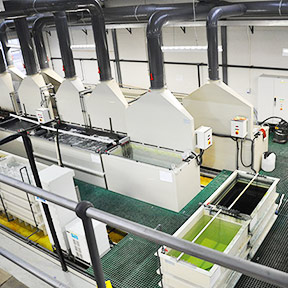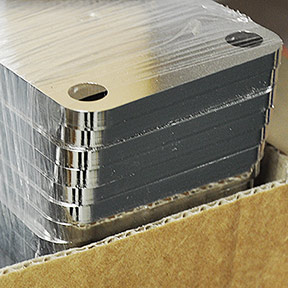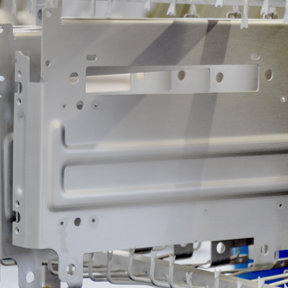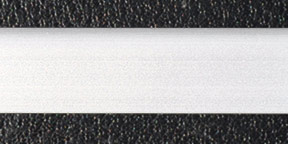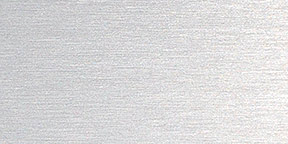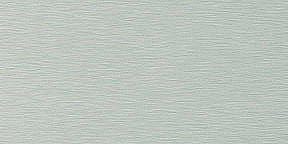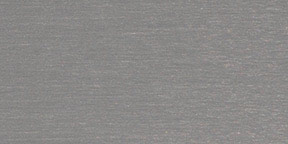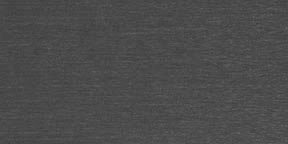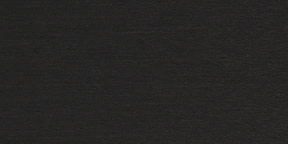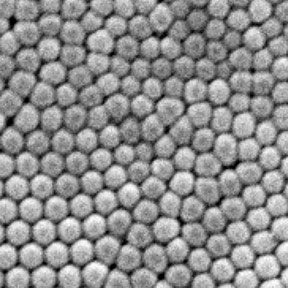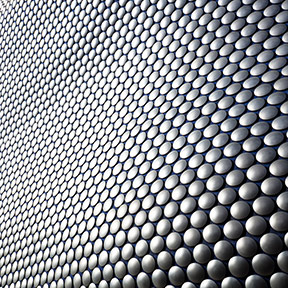Anodising aluminium
Bookmark this guide for reference to our aluminium finishing processes, get the best result and avoid pitfalls with the ideal aluminium anodising finishes. Unlike other coatings, anodising is an oxidising process that both ingresses and grows on the surface equally. Glenmore Hane have been anodising in Slough since the 1990's and boast one of the best anodising plants in the UK for aluminium corrosion protection, wear resistance, decorative and adhesive coatings for further finishing processes.
We recommend (for good to excellent anodising results):
• Bright anodising: 1000, 5000, 6000
• Colour Anodising: 1000, 3000, 5000, 6000
• Protective anodising: 1000, 3000, 5000, 6000
• Hard anodising: 1000, 3000, 5000, 6000, 7000
1000 Series Aluminium is essentially pure aluminium (99%) which responds very well to colouring and decorative work. Very capable where electrical conductivity is required and for food and catering environments.
• Bright anodising: Very good – excellent.
• Colour anodising: Excellent.
• Protective anodising: Excellent.
• Hard anodising: Excellent.
2000 Series Aluminium is alloyed with Copper to provide more strength and improve machining characteristics with typical application in aircraft manufacture; fuselage and wings.
• Bright anodising: Unsuitable.
• Colour anodising: Fair (with dark colours).
• Protective anodising: Fair.
• Hard anodising: Fair.
3000 Series Aluminium is alloyed with Manganese for excellent corrosion protection. 3000 Series aluminium welds very well and is so applied to architectural and outdoor fittings, roofing, heat exchangers, drink cans etc.
• Bright anodising: Poor – fair.
• Colour anodising: Good.
• Protective anodising: Good.
• Hard anodising: Good.
4000 Series Aluminium is alloyed with Silicon for excellent flow characteristics when molten, good for complex dies and welding. Good corrosion resistance and anodises well (if not decorative) in dark grey and black finishes. Works well for architectural and outdoor fittings, aerospace applications and armoured vehicles.
• Bright anodising: Unsuitable.
• Colour anodising: Good.
• Protective anodising: Good.
• Hard anodising: Fair.
5000 Series Aluminium is alloyed with Magnesium which depending on the % added allows for a hard base strength at a wide range of temperatures, it welds well and maintains good anti-corrosion properties even in salt water. Often specified for bridges, marine finishes, architectural and outdoor fittings, automotive panels, automotive parts and bright trim, computer cases and server chassis.
• Bright anodising: Very good.
• Colour anodising: Very good.
• Protective anodising: Excellent.
• Hard anodising: Excellent.
6000 Series Aluminium is alloyed with Magnesium and Silicon for good corrosion resistance, tensile strength and extrudability. Regarded as the most versatile aluminium for most applications and anodising finishing. Best for achieving a durable and premium satin aluminium finish (e.g. Macs, iPhones, MacBooks), dashboards, control boards and interfaces.
• Bright anodising: Good.
• Colour anodising: Good – very good.
• Protective anodising: Good – very good.
• Hard anodising: Very good.
7000 Series Aluminium is alloyed with Zinc for high strength and very high tensile strength applications such as on aircraft, aerospace projects, armoured vehicles and motorbikes.
• Bright anodising: Unsuitable.
• Colour anodising: Fair.
• Protective anodising: Fair.
• Hard anodising: Good.
Aluminium anodising thicknesses and hardness
Aluminium anodising creates an anodic oxide structure formed on the aluminium substrate, it's made of the aluminium oxide, not like a surface layer or coat that has been painted or plated. This means it won't peel or chip and is amenable to follow-up processes such as colouring and sealing. But avoid the higher zinc, copper and silicon alloy content aluminium (such as 2000 series) for decorative anodising finishes, they don't work. Where anodising does work, these measurements indicate the additional surface coating (to the original surface).
• Bright car trim: 2 microns.
• Decorative, low-wear, indoor use: 10 microns.
• Window frames: 12 micron.
• High-wear and corrosion resistance: 20 micron.
• Marine coat: 25 microns.
• Hard coat: 50+ microns.
1 micron (μm) is 1000th of a millimetre (mm).
Hard anodising is our most popular aluminium finish and the hardness of the coating varies depending on the alloy chosen.
High strength 2000 and 7000 aluminium alloys produce a hardness ranging from 250 – 350 micro Vickers, whereas 6000 aluminium ranges from 400 – 500 micro Vickers. Hard anodic coatings have better abrasion resistance than conventional coatings of the same thickness and will reduce fatigue strength by up to 47%.
Fine-limit aluminium anodised finishing.
The desired finish will all depend on material selection, pre-treatement and anodising. We have extensive graining and brushed finish options as well as matt (chemical etch) and satin aluminum finish like on Apple Macs, MacBooks and iPhones as well as finish textures achieved with sand, glass and bead blasting.
For more information about treatments,
aluminium alloy selection by design, type and technical specifications, benefits and restrictions, finish textures, or anything else ask us about aluminium and anodising characteristics and behaviours with guidance and advice on application. Further information can be read on our Anodising page along with tank sizes.
About us
Glenmore Hane remains committed to provide fine-limit sheet metal services by highly experienced and knowledgeable staff who can advise on test-proven production techniques as well as environmentally sound solutions. Specifically positioned on the M4 corridor with fantastic links across the UK. Glenmore Hane design, fabricate and finish high quality sheet metal components, fully qualified to work to ISO9001:2015 standards ensuring reliable and quality controlled production output on demand and on time. If you need precision sheet-metal prototypes or short run sheet metal fabrication and/or finishing – either send it direct through our website enquiry page, or contact Mark Hall on 01753 528884

